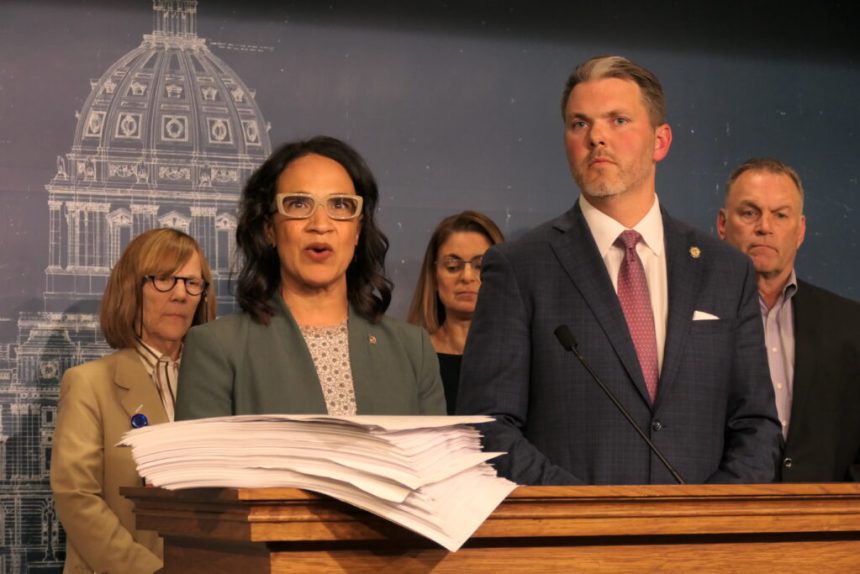House Minority Leader Lisa Demuth and Senate Minority Leader Mark Johnson spoke at a press conference shortly after the legislative session ended on May 20, 2024. The GOP leaders denounced the 1,400 page omnibus bill, which they displayed on the podium and was passed by the Democratic majority in the closing moments of the 2024 legislative session. (Photo by Michelle Griffith/Minnesota Reformer.)
A Ramsey County District Court judge on Monday struck down a 2024 law banning binary trigger devices — which double the rate of fire of semiautomatic firearms — as a violation of the state constitution’s rule requiring legislation to be about a single subject.
Although just the binary trigger ban was struck down, Judge Leonardo Castro used sweeping language about the DFL-controlled Legislature’s violation of the single-subject rule, clearing the way for potential litigation over a bevy of subjects included in the law, from Uber and Lyft driver wages to paid leave provisions.
The ruling didn’t strictly address the legality of binary triggers, but instead focused on the 1,400-page bill in which the binary trigger ban was included last year. In the final moments of the 2024 session, the DFL-controlled Legislature passed an “omnibus” bill — think: everything but the kitchen sink — that included 13 separate subjects, including minimum pay rates for Uber and Lyft drivers; alterations to the state’s paid leave program; and changes to make the child tax credit more user-friendly.
The Minnesota Constitution states “no law shall embrace more than one subject, which shall be expressed in its title.” The purpose is to prevent legislators from steamrolling provisions into big bills with little notice.
But bills running several hundred pages about a multitude of subjects are common, no matter which party controls the Legislature.
Castro said in his ruling that the Minnesota Supreme Court has considered dozens of cases challenging the state Constitution’s single-subject clause since 1857.
The case challenging the binary trigger ban was brought by the Minnesota Gun Owners Caucus, arguing the 1,400-page omnibus bill in 2024 was unconstitutional.
Castro ruled that the bill included many provisions that had nothing to do with one another.
“The 2024 Omnibus Bill violates the Single Subject and Title Clause, because, at best, it contains many non-germane parts, and at worst, has no identifiable common theme,” Castro wrote.
Despite his sweeping language, Castro employed judicial restraint. He refrained from invalidating all the provisions in the 1,400-page bill and only struck down the binary trigger ban. He did so because Minnesota Supreme Court precedent states that courts should favor striking certain provisions rather than invalidating entire bills, he wrote.
“But make no mistake, during the late hours of May 19, 2024, lawmaking did not ‘occur within the framework of the Constitution,’” Castro concluded. “This Court respectfully suggests that if there has ever been a bill without common theme and where ‘all bounds of reason and restraint seem to have been abandoned,’ this is it; and if there has ever been time for the ‘draconian result of invalidating the entire law,’ that time is now.”
Democrats proposed the binary trigger ban after a man fatally shot and killed two Burnsville police officers and a paramedic in early 2024.
A spokesperson for Gov. Tim Walz confirmed that the state will appeal the ruling.
“This law was passed in the aftermath of the horrific killing of three first responders in Burnsville, and was intended to help ensure such a tragedy does not happen again. The governor stands firmly behind this law and plans to appeal this decision,” the spokesperson said.









